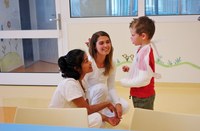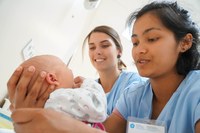Study Programme: NURSING
Basic facts:
Level: Bachelor
Full-time study
Language: English
Length: 6 Semesters / 3 Years / 180 Credits
Application deadline: April 30
Start of the tuition: October
Tuition fee: 4, 600 EUR per year
Detailed curricula
Application process
|
|
|---|
This is a three-year study course. After its completion, graduates will achieve qualifications to work in the medical profession. The tuition is provided in English language.
The main reason for the implementation of this kind of study programme was to establish an educational programme that is compatible with countries of the European Union, which will contribute to the implementation of a new conception of nursing care oriented in active individual care in hospital practice. In primary care, it will contribute to the healthy lifestyle of the population and disease prevention. The content of the curricula was set up to familiarise students with all the necessary knowledge and skills for providing the profession of a general nurse. The output knowledge and skills obtained by students during the study are in accordance with basic competence criteria that are defined in documents of the European Commission. These competencies cover: care for children, youth, adults and seniors with acute and chronic health disorders and somatic and psychological difficulties.
It also includes inpatients and outpatients. Nurses will learn how to maintain, protect, and support the health of individuals and groups. They will also gain independence and self-sufficiency in the sphere of physical and mental life functions with regard to psychological, social, economic and cultural differences of the way of life of disabled people. The length of professional preparation is 3 years and the number of preparation hours is 4,600, of which 2,300 hours are the practical part of tuition. In individual semesters the theoretical and practical blocks can change. The content of the study originates from the tuition about health, healthy individuals, and its relation to social surroundings. Nursing is focused on the independent work of the nurse in prevention, in helping with the development of patient/client self-sufficiency, and in providing individual care through the method of the nursing process.
Practical tuition is performed in establishments of primary care and in clinical workplaces - which are chosen on the basis of defined standards. The first year of practical training is focused on the area of primary care, i.e. on health support and prevention. Students will be acquainted with the structure of primary care services and with individual types of establishments in primary care. They will learn to assess the environment (material and social) in which people live, and the risks for their health. They will then be acquainted with the kinds of illnesses that are present in the environment, and the need for preventive measures and methods of individual and group health education. They will learn to assess the health condition and the needs of clients in terms of nursing care. In the other years of study, the practical training focuses on secondary and tertiary care, and particularly on specialities of the nursing process with clients at individual clinical departments. It is focused on the elaboration of an individual plan of nursing care with given clients. In this part, students will learn to perform care in households through the method of the nursing process.
The subjects in the curricula are divided into three groups: compulsory, optional compulsory and elective. Students can choose from a list of optional compulsory course units in accordance with their own interests and focus. However, students must respect the relevant number of set credits, which they must obtain during the study of these groups of subjects. During the three-year study period, students must obtain 180 ECTS, of which 144 ECTS are compulsory course units, 18 ECTS are optional compulsory course units, and 18 ECTS are elective course units.
After the successful completion of all subjects and obtaining the set amount of ECTS, a student can sit the state final examination, in which he/she defends his/her bachelor thesis. After the successful passing of the state final examination, students will be awarded a diploma - which will be handed to him/her during the graduation ceremony. Students will also be given a Diploma Supplement, which will be attached to the University Diploma. The purpose of this is to provide sufficient and independent information about the study courses, the aim of which is to improve international transparency and to guarantee credible academic and professional approval of qualifications.
Graduates will be able to use the qualification to obtain work in outpatient and inpatient medical facilities. They will have the theoretical and practical qualifications for the management of a nursing team, private practice, or for the management of nursing agencies.
For further information about the study programme contact: nursing@zsf.jcu.cz







